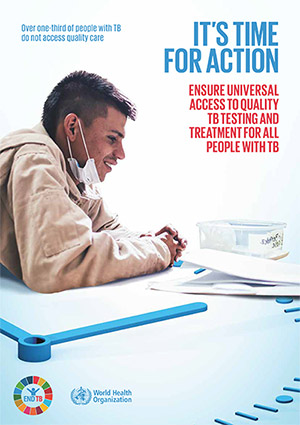
21 March 2019, Cairo, Egypt ‒ On the occasion of World TB Day, Dr Ahmed Al-Mandhari, WHO Regional Director for the Eastern Mediterranean, said that WHO called on governments, affected communities, civil society organizations, health care providers, and national/international partners to act now to detect and treat all tuberculosis (TB) cases to end the global epidemic and ensure that no one is left behind. He said that all should work together and act now towards ending TB.
World TB Day is commemorated each year on 24 March to raise public awareness about the devastating health, social and economic consequences of the disease, urge national policy- and decision-makers to scale up efforts to eliminate TB and step up efforts to end the global epidemic. TB is one of the top 10 leading causes of death globally and yet is both curable and preventable.
The theme of this year’s campaign “It’s time for action! It’s time to End TB” emphasizes the urgent need to act on the commitments made by heads of state and governments in the first ever United Nations General Assembly Political Declaration “United to End Tuberculosis: An Urgent Global Response to a Global Epidemic”. The Declaration reflects high-level commitment to scale up access to prevention and treatment, build accountability, ensure sufficient and sustainable financing, including for research, promote an end to stigma and discrimination, and support an equitable, rights-based and people-centred TB response.
TB is a highly contagious disease and the leading cause of death from a single infectious agent. Globally, 10 million people developed TB disease in 2017 and it caused an estimated 1.6 million deaths. In the Eastern Mediterranean Region, the number of people who developed TB in 2017 exceeds 750 000, and among those about 4% have drug-resistant TB.
Significant efforts have been exerted globally to eliminate TB and at the regional level significant progress has been made in fighting the disease in the past few years.
“Despite challenges, WHO’s Eastern Mediterranean Region achieved the highest treatment success rates among drug-sensitive, as well as drug-resistant, TB cases, 92% and 62%, respectively,” said Dr Al-Mandhari, “even though many of our countries remain in complex emergency situations. This commendable achievement reflects the resilience, dedication and commitment of national TB programmes, health workers, donors, activists and communities to end this deadly disease.”
However, more action is needed to translate commitments into concrete action to address the key challenges. Finding missing TB cases, addressing the multidrug-resistant TB crisis and TB among children, fostering public–private partnerships, and establishing enabling environments to reach End TB targets are the main global challenges to be addressed.
In the Region, in addition to these challenges, there is an urgent need to focus on scaling up diagnosis and notification. One third of TB cases are either undiagnosed or not notified to national tuberculosis programmes, while 80% of people with drug-resistant TB are not detected. Another critical challenge is an overall funding gap of 36% and over-reliance on international funding; 43% of the available budget in 2017 came from international sources and only 21% from domestic sources.
World TB Day is a great opportunity to renew our commitments to End TB; It’s time for action!.


